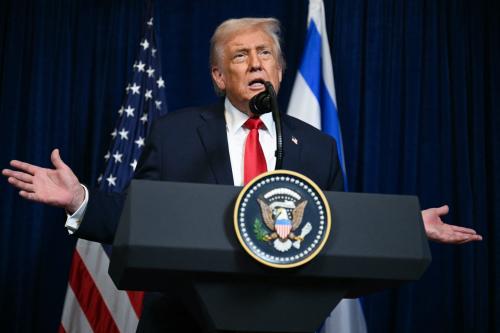Palestinian President Mahmoud Abbas’ decision last week to sign the Rome Statute, the treaty governing the International Criminal Court (ICC), has sparked considerable anger and confusion. The move, which had been a “red line” in Israel and Washington, has outraged Israeli leaders and put an end to any residual hopes U.S. officials might have had for restarting the moribund peace talks. The Obama administration condemned the move as “entirely counterproductive” and one that “does nothing to further the aspirations of the Palestinian people for a sovereign and independent state.” The Israeli response was equally predictable, halting tax transfers that account for nearly two-thirds of the Palestinian Authority’s (PA) budget, while Congress is said to be reconsidering $400 million in annual U.S. aid to the PA.
Indeed, the move carries additional risks for the Palestinians, since there is no assurance that the ICC will open an investigation into alleged war crimes in Palestinian territory—and even if it did, charges could also be brought against Palestinians and not just Israelis. So why then have the Palestinians chosen a path that promises so much pain and offers so little gain?
While it may seem irrational or even reckless to pursue such a course, the Palestinian decision to join the ICC is both rational and considered. (Whether it will prove successful or effective, however, is of course another matter.) For Israelis, the prospect of having their leaders brought before an international tribunal for war crimes is understandably unnerving. As far as Palestinians are concerned, however, the move is directed as much at Washington as it is at Israel.
Abbas’ decision to join the ICC is part of a broader strategy of internationalizing the conflict in order to increase pressure not only on Israel but on the United States as well. Despite what many believe, the strategy is not designed to bypass or preclude negotiations but to give the Palestinians some badly-needed leverage in a future negotiations process—albeit one that is built on an entirely different framework and structure. As far as Palestinians are concerned, the old peace process dominated exclusively by the United States, and its many domestic political constraints, is no longer tenable—and judging by the growing number of initiatives to recognize Palestinian statehood, much of the international community seems to agree.
The standard argument in Washington is that even if prospects for a negotiated settlement with Israel look bleak (and they do) they are still the best, if not the only, chance for Palestinians to achieve an independent state. Such arguments, in addition to denying Palestinian agency, overlook the extent to which the “peace process”, as currently constructed and led by the United States for the last two decades, has become a liability for the Palestinians—physically, politically and diplomatically.
Failure has a price, and the Palestinians have thus far borne the brunt of the repeated failures of the peace process. While it may be true, as some argue, that joining the ICC cannot “not alter the reality on the ground,” the same could be said of the U.S.-led peace process. Two decades of “peace processing” have brought Palestinians no closer to an independent state, while leaving them with a divided and dysfunctional polity made up of a war-shattered and besieged Gaza Strip and a West Bank that has been colonized and fragmented beyond recognition.
Whereas ordinary Palestinians have long since given up on the U.S.-sponsored peace process, President Abbas only came to this conclusion belatedly and reluctantly. Abbas has repeatedly made clear his preference for a credible negotiations process and that the decision to turn to the United Nations and the ICC was a last resort. But recent events have forced him to reconsider. The collapse of yet another round of U.S.-brokered peace talks last spring amid a flurry of Israeli settlement announcements—the third such failure during Abbas’s decade-long rule—along with the recent unrest in Jerusalem and last summer’s Gaza war highlighted the Palestinian president’s growing irrelevance and exposed the limits of American mediation.
The Gaza war especially, in which more than 2200 Palestinians were killed, severely damaged Abbas’s standing among Palestinians, as recent polls have shown. Since then, popular and civil society calls for holding Israeli political and military leaders accountable for alleged war crimes have intensified, with an overwhelming majority favoring joining the ICC. With armed Palestinian groups like Hamas and Islamic Jihad having publicly already expressed support for the move, despite their own exposure to potential prosecution, it became impossible for Abbas to delay the matter any longer.
The fact that Mahmoud Abbas—perhaps the most accommodating Palestinian leader the U.S. has ever known (or is likely to see again in the future)—would rather face Israeli and congressional sanctions than return to an American-dominated peace process should give American policymakers great pause.
Despite the noise in Washington and Israel, Palestinian accession to the ICC may not be the “nuclear option” some have made it out to be. On the other hand, there are two scenarios that could lead to the sort of “mutually assured destruction” many now fear: ending the PA’s security coordination with Israel and the collapse of the PA, either of which could spell the end of the two-state solution itself. Abbas currently has no interest in either of these scenarios, but may not be able to prevent them should Israel or the Congress carry through with threats to defund or otherwise punish the PA.
While Abbas’ decision to join the ICC may seem “pointless” and “self-defeating” to those in Washington and Israel, it would be equally if not more so to expect the Palestinian leader to ignore his own public opinion let alone two decades of a failed peace process.
The Brookings Institution is committed to quality, independence, and impact.
We are supported by a diverse array of funders. In line with our values and policies, each Brookings publication represents the sole views of its author(s).




Commentary
The Real Reason Washington Should Worry About Abbas’ ICC Bid
January 7, 2015